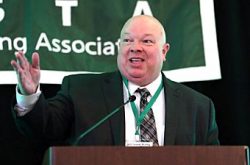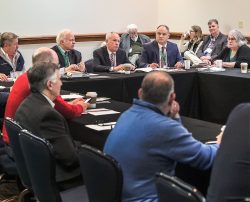Columbus, OH — At the U.S. Trotting Association’s annual meeting in Columbus, Ohio, on Sunday (March 13), the Board of Directors voted to keep freeze brands as an optional form of additional horse identification. Since Jan. 1, 2022, the USTA has required that all horses be microchipped for identification in order to be eligible for racing.

“The rule change proposals to require a freeze brand in addition to a microchip were discussed at every district meeting and were seriously debated by the directors here at the annual meeting,” said USTA Executive Vice President and CEO Mike Tanner. “In the best interests of all USTA members that they represent, along with consultation with representatives from Standardbred Canada, the directors voted to keep only the microchip mandatory for horse identification, but strongly encourage all horse owners and breeders that so desire to add a freeze brand to their horses.
“The USTA and Standardbred Canada remain the only major breed registries in the world to offer this option as a second means of identification.”
Microchips are the international standard for equine identification for all breeds. With the exception of Standardbred Canada, who recently changed their policy to reflect the USTA’s policy of allowing for optional freeze brands, no other breed registry allows for secondary horse identification, such as freeze brands or lip tattoos.
The USTA has partnered with Merck Animal Health for the use of Bio-Thermo microchips that incorporate temperature scanning as well as horse identification. In addition, coupling the USTA Chip ID app, featuring the EquiTrace horse health management system, consolidates equine health record keeping including temperature charting, logging therapeutic medications, veterinarian records, GPS and more.
First up on Sunday (March 13) morning was the Rules Committee followed by the Board of Directors Closing General Session.

The rule change proposals were presented to the Rules Committee with the following recommendations from the Racing Committee. With the exception of rule change proposal number 16, which the Rules Committee voted to table, all others were accepted as recommended.
(The full board vote is in parentheses).
1. Medical assistance/back-up ambulance (APPROVED)
Racing – Approved.
Rules – Approved.
2. County fair charting timeline (by 11:59 p.m. of race date) (APPROVED)
Racing – Approved.
Rules – Approved.
3. Microchip optional for horses born before 2019 (REJECTED)
Racing – Rejected.
Rules – Rejected.
4. State vet regulation of microchips (REJECTED)
Racing – Rejected.
Rules – Rejected.
5. Draw video and recording (APPROVED)
Racing – Approved.
Rules – Approved.
6. Blood samples for claims (APPROVED)
Racing – Approved.
Rules – Approved.
7. Voidable claims injury (APPROVED)
Racing – Approved.
Rules – Approved.
8. Stakes payment dates (APPROVED)
Racing – Approved.
Rules – Approved.
9. Driver selection in stakes races (REJECTED)
Racing – Rejected.
Rules – Rejected.
10. Interference before start (REJECTED)
Racing – Rejected.
Rules – Rejected.
11. Trainer continuing education (REJECTED)
Racing – Rejected.
Rules – Rejected.
12. Whip specifications (REJECTED)
Racing – Rejected.
Rules – Rejected.
13. Breaking horse disqualification (REJECTED)
Racing – Rejected.
Rules – Rejected.
14. Stallion limit increase (REJECTED)
Racing – Rejected.
Rules – Rejected.
15. Charitable breedings offered (REJECTED)
Racing – Rejected.
Rules – Rejected.
16. Outstanding horse names (APPROVED)
Racing – Tabled.
Rules – Approved.
17. No horse name changes (REJECTED)
Racing – Rejected.
Rules – Rejected.
18. ID of broodmares (REJECTED)
Racing – Rejected.
Rules – Rejected.
19. Embryo transfers (REJECTED)
Racing – Rejected.
Rules – Rejected.
20. Parentage verifications (REJECTED)
Racing – Rejected.
Rules – Rejected.
21. Horse ID requiring both microchip and freeze brand (REJECTED)
Racing – Rejected.
Rules – Rejected.
22. Breeder location (REJECTED)
Racing – Rejected.
Rules – Rejected.
23. Equestrian membership fees (TABLED)
Racing – Tabled.
Rules – Tabled.
24. Addition of equestrian membership (bylaw) (TABLED)
Racing – Tabled.
Rules – Tabled.
25. Universal election date for directors (bylaw) (APPROVED)
Racing – Approved.
Rules – Approved.
26. Trainer continuing education (bylaw) (REJECTED)
Racing – Rejected.
Rules – Rejected.
At the Board of Directors Closing General Session that followed, rule change proposal number 23 and bylaw change proposal 24 were tabled to be voted on by a special board meeting in the future. The directors voted to accept the recommendation of the Rules Committee on all other rule change proposals.
During the session, Chairman Faraldo explained the horse slaughter law that has gone into effect in New York state and the repercussions it could have on the last owner listed in the USTA database. He also requested of USTA Executive Vice President and CEO Mike Tanner that the Strategic Wagering presentation by Michael Carter in the Pari-Mutuel Committee be sent to all directors.
The following committee reports were given and approved by the full Board, Rules by Chairman Mark Loewe, Registration by Chairman Dr. John Mossbarger, Finance by Vice Chairman Don Marean, and Rules by Loewe.
Marean indicated that the budget had been amended in the Finance Committee to include a five dollar increase in transfer fees to help fund the Standardbred Transition Alliance and the budget was increased to include a new position for a Standardbred Racing Investigative Fund liaison at the USTA.

In his closing remarks, USTA President Russell Williams said that the location for the 2023 annual meeting has not been determined yet and quoted former President Corwin Nixon about the success of this year’s meeting. He also gave an update on HISA.
“Corwin Nixon used to say, ‘this was the best meeting ever,’” said Williams. “But it is certainly true this year. It’s astonishing how much work got done here.”
He also expressed a positive outlook for the future of the organization.
“If you look at the Board of Directors, you see some young directors and that makes me optimistic about the future,” added Williams.
In an update on HISA, Williams indicated that a judgment in one of the two federal lawsuits challenging the constitutionality of the law may be forthcoming in the next week or two.
“If you’re in favor of HISA, you’re not wrong with the goals of HISA,” said Williams. “There needs to be reform, but there is a better way to do it.”
Before adjourning, Chairman Faraldo said that the Board still had to vote on bylaw number 25 establishing a national election day on the second Tuesday of December each year and it was unanimously approved.
The meeting was adjourned at 10:33 a.m.
